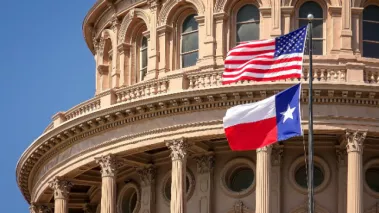Table of Contents
Texas joins Arizona in declining to enforce laws mandating no-boycott promises from campus speakers

As boycotts targeting Israel have ramped up in recent years, a number of state legislatures have responded by enacting laws requiring that state government contracts include anti-boycotting provisions. In short, before you enter into a contract with a state entity, you have to promise that you’re not boycotting Israel — an expressive act long recognized as protected by the First Amendment. Because these statutes apply to state colleges and universities, campus speakers — often reimbursed for their travel expenses, or otherwise paid for their time — have discovered that their speaking engagements require them to agree not to boycott Israel.
The Houston Chronicle reports about one such contract:
In February, Vanessa Angélica Villarreal gave a workshop and reading at the University of Houston’s Spanish program in creative writing. The University of Southern California Ph.D. candidate met students and promoted her first book at the event.
But she was surprised in April to hear that, in order to receive payment for her appearance, she needed to sign a clause retroactively pledging not to boycott Israel.
“This is an attack on free speech,” said Villarreal, who earned her bachelor’s degree at UH. “It’s a matter of integrity.”
A state law that went into effect in September prohibits state entities — including public colleges and universities — from contracting with or investing public money in companies that boycott Israel. A company, by Texas’ definition, includes for-profit sole proprietorships, associations, organizations and corporations.
After a backlash, however, the Texas Office of the Attorney General reportedly told the University of Houston not to worry about the law:
UH spokesman Mike Rosen said that in April, the state attorney general’s office told UH that it could exclude campus speakers from the law, though the Houston Chronicle could not confirm that guidance was issued. Villarreal learned that month that UH would not require her to sign the form. The university has a signed form on file, but Villarreal maintains she did not sign it.
It’s not clear what basis Texas’ law enforcement has in declining to enforce the law. Texas’ statute extends to any “sole proprietorship,” which does not appear to require formal structure or recognition in Texas, meaning an individual’s contracts are, by default, the acts of a sole proprietorship. The law further extends to any “affiliate” of any “organization” or “association” that takes “any action that is intended to penalize, inflict economic harm on, or limit commercial relations specifically with Israel.”
In other words, any time a Texas state entity, including state universities and colleges, contracts with any person, including a campus speaker or lecturer, that person must agree not to engage in a boycott of Israel. There’s no exception in the law for universities or speakers.
Reading exceptions into these laws after they attract unwanted attention is familiar. Earlier this year, Arizona State University told a federal court that it had mistakenly sent a speaker an “incorrect, older form contract,” and that the university had determined — and that Arizona’s attorney general agreed — that Arizona’s similar statute didn’t apply to speakers at all, as they were not providing a “service” to the university. As FIRE pointed out at the time, the statute doesn’t define “service” and even the university’s revised contract referred to speakers as providing a “service.”
In New York, meanwhile, a blacklist imposed by the governor’s executive order was so broad that it could have encompassed not only student organizations that engaged in boycotts themselves, but also student groups that encouraged others to engage in boycotts. To avoid the most obvious First Amendment issue with the order, the governor’s counsel later issued guidance effectively reducing the provision to a nullity. (Yet another bill still pending in the New York state legislature would expressly strip student organizations of funding if they expressed support for boycotts of particular nations.)
That’s not to complain that these laws aren’t being enforced. While it’s welcome news that some of these statutes aren’t being enforced against speakers capable of raising public outcry, the risk of a chilling effect will not dissipate simply because law enforcement promises not to enforce the law this time. Rather, the continued maintenance of dubious regulations of speech, enforced or not, is itself an ongoing threat to freedom of expression.
For one, laws are not written to be enforced — as the Supreme Court has observed — “at the mercy of noblesse oblige.” In other words, broad laws should not be upheld with the hope that they will only be deployed against conduct we disfavor. The promise that a law won’t be enforced against a university, no matter the terms of the statute, is a promise that can be rescinded — if, for example, its non-enforcement becomes controversial or if it would serve as a useful tool against a particularly objectionable speaker.
Further, agreeing not to enforce the statute against a university in a particular instance does not guarantee that a policy of non-enforcement will be effectively communicated to other institutions. As with the example of Arizona State, old contracts with the provision might remain online or be provided to speakers in error, or a different institution might not be aware that it should remove the provision from its speaker contracts.
Instead of selectively enforcing these statutes — if they’re enforced at all — legislatures should amend them to protect freedom of expression on campus, or rescind them entirely. FIRE is happy to assist legislators in any state to ensure that freedom of expression on campus is protected.
Recent Articles
FIRE’s award-winning Newsdesk covers the free speech news you need to stay informed.

The FCC's show trial against CBS is a political power play

UPDATE: Another federal appeals court backs academic free speech for public employees

Feds to Columbia: ‘You want $400 million in contracts back? Do this (or else)’
